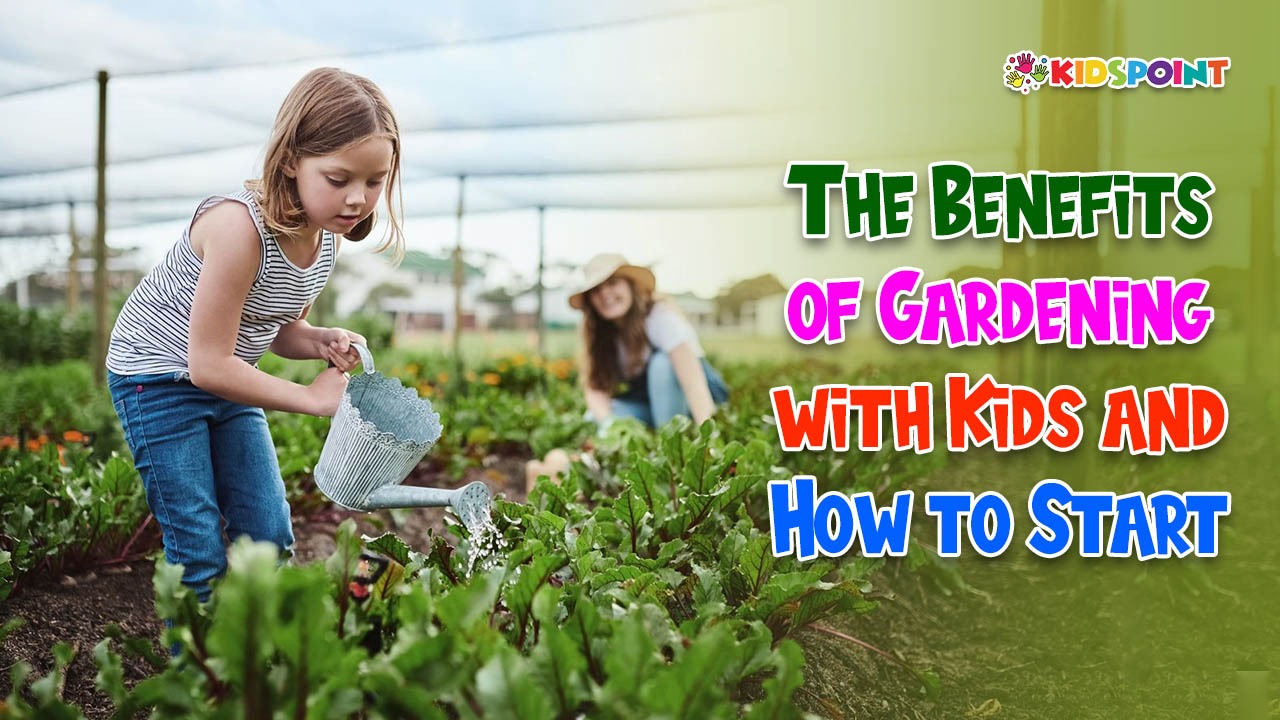Gardening isn’t just for adults seeking a peaceful hobby or a bountiful harvest; it’s also an incredibly enriching activity for children. In an age where screens dominate free time, gardening offers a tangible, educational, and therapeutic experience that fosters a deeper connection with nature and promotes various developmental benefits. Whether you have a sprawling backyard or just a few pots on a balcony, here’s why you should consider gardening with your kids, and how to get started on this rewarding journey with “The Kids Point.”
The Benefits of Gardening with Kids
Educational Benefits
Gardening serves as a living laboratory where kids can learn about biology, botany, and ecology firsthand. Through planting seeds, observing plant life cycles, and understanding the role of insects and soil, children develop a deeper appreciation for the natural world.
- Hands-on Learning: Engaging in activities like planting, watering, and weeding helps children understand the practical aspects of plant care.
- Science Exploration: Learning about photosynthesis, plant nutrition, and the ecosystem through gardening activities promotes scientific curiosity.
Health and Physical Development
Gardening encourages physical activity and improves overall health and well-being among children. Digging, planting, and harvesting involve various muscle groups and provide valuable exercise outdoors.
- Physical Activity: Gardening tasks such as digging and watering contribute to children’s daily exercise needs.
- Sensory Stimulation: Handling soil, smelling flowers, and tasting fresh produce engage multiple senses, enhancing sensory development.
Emotional and Social Benefits
Gardening fosters emotional resilience and social skills by teaching children patience, responsibility, and teamwork. Working together in a garden environment encourages cooperation and empathy.
- Responsibility: Caring for plants teaches children the importance of responsibility and commitment.
- Teamwork: Collaborating with family members or peers in a garden setting promotes teamwork and communication skills.
Nutritional Awareness
Growing fruits, vegetables, and herbs empowers children to make healthier food choices and understand where their food comes from. Learning to grow and harvest their own produce promotes nutritional awareness and encourages a diverse diet.
- Healthy Eating Habits: Children are more likely to eat fruits and vegetables they have grown themselves.
- Food Literacy: Understanding the journey from seed to table enhances children’s appreciation for fresh, nutritious foods.
Environmental Awareness
Gardening instills environmental stewardship by teaching children the importance of conservation, sustainable practices, and biodiversity. Learning about composting, water conservation, and organic gardening practices promotes eco-friendly habits.
- Sustainability: Teaching children about composting and recycling in the garden promotes environmental sustainability.
- Biodiversity: Creating habitats for beneficial insects and birds fosters an appreciation for biodiversity and ecological balance.
How to Start Gardening with Kids
Choose a Suitable Location
Select a garden space that receives adequate sunlight and is easily accessible for children. Consider container gardening or raised beds if space is limited.
Gather Gardening Supplies
Gather essential gardening tools such as child-sized gloves, shovels, watering cans, and seeds or seedlings appropriate for your climate and soil type.
Plan and Prepare the Garden
Involve children in planning the garden layout and selecting plants they are interested in growing. Prepare the soil by loosening it with a garden fork or tiller and adding compost for nutrients.
Planting and Caring for Plants
Show children how to plant seeds or seedlings at the correct depth and spacing. Demonstrate watering techniques and explain the importance of regular maintenance such as weeding and mulching.
Observe, Learn, and Enjoy
Encourage children to observe plant growth, record observations in a garden journal, and ask questions about the natural processes they witness. Celebrate milestones such as the first sprout or ripe vegetable.
Harvest and Enjoy the Fruits of Labor
When plants mature, involve children in harvesting produce, tasting fresh fruits and vegetables, and preparing simple recipes using garden ingredients.
Gardening with kids is more than just a hobby—it’s a valuable educational tool, a source of physical activity, and a way to foster environmental stewardship and family bonds. Whether you have a green thumb or are just starting out, gardening provides endless opportunities for children to learn, grow, and connect with nature. So, roll up your sleeves, grab some seeds, and watch as your children discover the wonders of gardening—one plant at a time.
By introducing children to the joys of gardening with “The Kids Point,” you are not only nurturing their love for nature but also empowering them with skills and knowledge that will benefit them throughout their lives. Start small, stay patient, and enjoy the journey of watching your children bloom alongside their garden.


